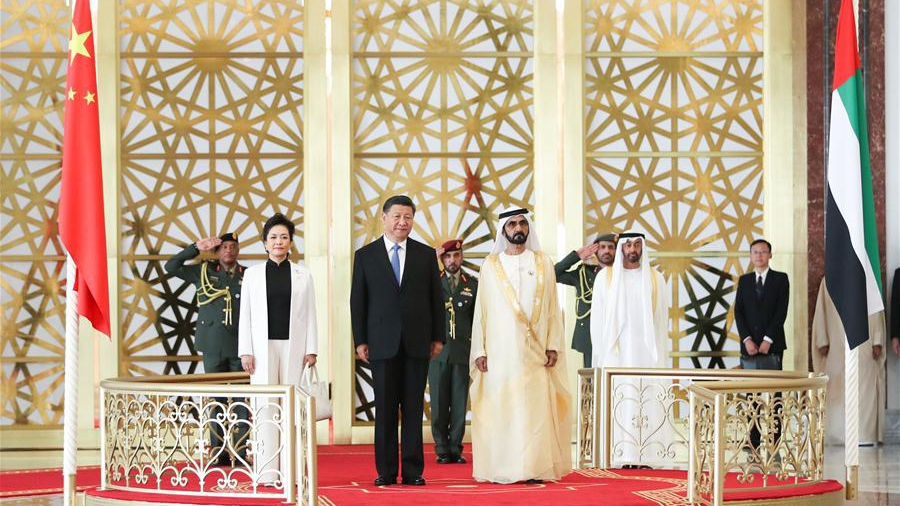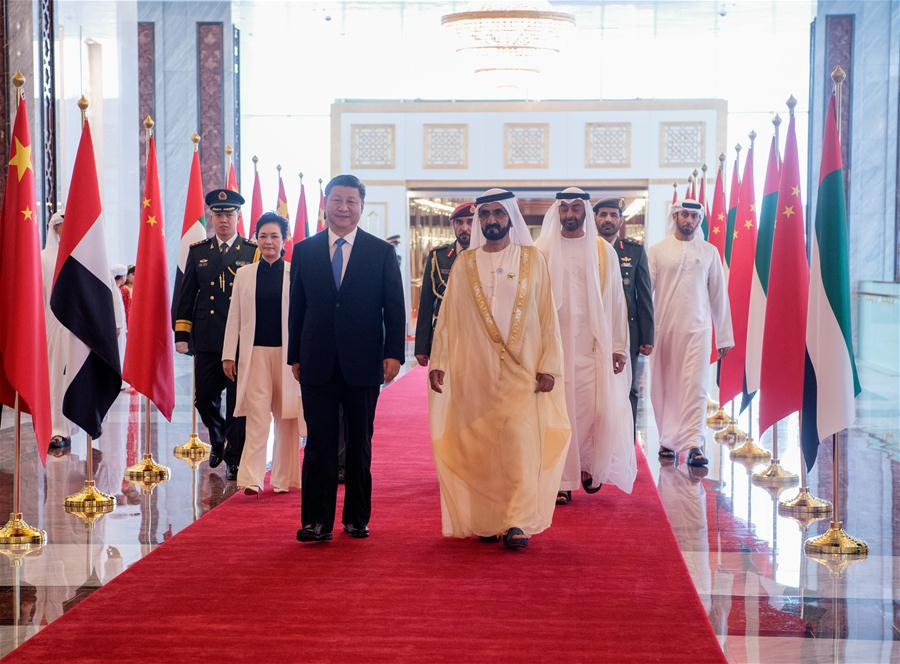
Opinions
22:49, 20-Jul-2018
Opinion: Sino-UAE cooperation sets a new standard for the world
Updated
22:22, 23-Jul-2018
Wang Jin

Editor's note: Wang Jin is a research fellow of the Charhar Institute and Syria Research Center from Northwest University in China. The article reflects the author's views, and not necessarily those of CGTN.
Chinese President Xi Jinping's visit to the United Arab Emirates is a vitally important milestone for the Belt and Road Initiative (BRI), and both China and the UAE perceive Xi’s visit as an important opportunity to enhance their friendship.
The UAE’s warm and affectionate welcome for President Xi demonstrated its willingness to deepen cooperation with Beijing, while the Memorandum of Understanding on the Cooperation over Key Areas, which was signed by China and UAE leaders, will facilitate and encourage cooperation between Chinese and UAE firms in fields such as finance, Internet, energy and investment.
Just after Xi’s arrival in Abu Dhabi, the Abu Dhabi National Oil Company (ADNOC) awarded one of the largest seismic surveys for hydrocarbons assets in the world to BGP, a subsidiary of the China National Petroleum Corporation (CNPC).
Not long ago, the CNPC was awarded a 40-year rights agreement by ADNOC for concessions offshore Abu Dhabi.
The scale of these projects shows the UAE’s willingness to work with China to explore the opportunities of upstream investment and represents a milestone in the UAE’s strategic energy cooperation with China.
The UAE has become an important partner for China. There are already 2,000 Chinese companies operating in the UAE and more than 1 million Chinese visitors arrived in the UAE last year.
China appreciates the UAE’s efforts in joining the BRI, and the UAE’s strategic geographic importance, inclusive society and ambitious development plan.
China is willing to more closely cooperate with the UAE to construct a better world through the BRI.

UAE Vice President and Prime Minister Sheikh Mohammed bin Rashid Al Maktoum hosts a welcome ceremony for Chinese President Xi Jinping and his wife Peng Liyuan in the UAE, July 19, 2018. /Xinhua Photo
UAE Vice President and Prime Minister Sheikh Mohammed bin Rashid Al Maktoum hosts a welcome ceremony for Chinese President Xi Jinping and his wife Peng Liyuan in the UAE, July 19, 2018. /Xinhua Photo
Today, the world is at a critical juncture as the multilateralism once spearheaded by the most developed state in the world is giving way to unilateralism and polarization by Donald Trump.
Should different states cut off their contact with the outside world to pursue interests based upon the principle of narrowly defined nationalism, or should they keep opening to other states to establish closer ties with the world, regardless of different ideologies, regime styles and religions?
The BRI might be the answer. It's based on the principle of achieving shared growth through discussion and collaboration, and is becoming an economic corridor that will eventually consist of ports, airports, roads, railways, and Internet lines, connecting the whole world.
Both China and the UAE are aware of the importance of the BRI and are willing to cement their ties with each other.
China and the UAE are closely coordinating with each other to explore more opportunities not only in infrastructure, but also in e-commerce, finance, tourism and high-tech R&D.
President Xi’s visit marks the beginning of a new chapter in Sino-UAE relations and the bilateral deepening and widening cooperation will not only benefit both countries, but lead the trend of multilateralism and globalization for the whole world.

SITEMAP
Copyright © 2018 CGTN. Beijing ICP prepared NO.16065310-3
Copyright © 2018 CGTN. Beijing ICP prepared NO.16065310-3